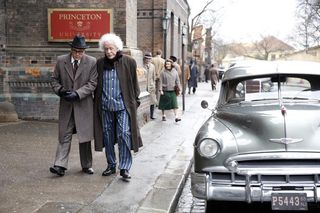Einstein Goes Out with a Bang in Nat Geo's 'Genius'
Nat Geo's "Genius" ends with a bang as the world-renowned physicist Albert Einstein gets involved with the first atomic bombs and the FBI tries desperately to catch him committing communist acts of crime.
The FBI obsessed over Einstein for the last two decades of the scientist's life, keeping a secret dossier with more than 1,400 pages of notes about his "radical" behavior until the day he died.
Meanwhile, in the new episode, Einstein finally becomes a U.S. citizen and becomes involved with American politics during World War II, persuading President Franklin D. Roosevelt to pursue a nuclear program before Nazi Germany could build the first atomic bomb.
Amidst his newfound political involvements, Einstein also continues his research at Princeton University in New Jersey, working to unify relativity, electromagnetism and quantum mechanics mathematically with what he called the "unified field theory." [The 'Genius' of Albert Einstein on Nat Geo Channel (Photos)]

As the aging physicist begins to lose some of his mental acuity, he also copes with the loss of multiple loved ones. Even after becoming a grandparent, Einstein was never very involved with his children's lives. He finally reconciles with his estranged family before time runs out, but his work was left unfinished.
Einstein kept trying to solve his elusive unified field theory through the very last hours of his life. At his bedside in the hospital was a notebook containing 12 pages of calculations — many of them crossed out or scribbled over — that Einstein hoped could bring the world one step closer to understanding the universe.

Unfortunately, Einstein wasn't able to unify the fundamental forces before his death on April 17, 1955. He was 76 years old. But researchers today are still working to come up with the same kind of unified theory Einstein had worked so tirelessly to conceptualize during the last three decades of his life. This has led modern physicists to pursue a concepts like the "theory of everything" and string theory.
Get the Space.com Newsletter
Breaking space news, the latest updates on rocket launches, skywatching events and more!
See how the last years of Einstein's life played out with the 2-hour season finale of "Genius" tonight (June 20) at 9 p.m. Eastern Time, 8 p.m. Central Time on the National Geographic Channel.
Email Hanneke Weitering at hweitering@space.com or follow her @hannekescience. Follow us @Spacedotcom, Facebook and Google+. Original article on Space.com.
Join our Space Forums to keep talking space on the latest missions, night sky and more! And if you have a news tip, correction or comment, let us know at: community@space.com.

Hanneke Weitering is a multimedia journalist in the Pacific Northwest reporting on the future of aviation at FutureFlight.aero and Aviation International News and was previously the Editor for Spaceflight and Astronomy news here at Space.com. As an editor with over 10 years of experience in science journalism she has previously written for Scholastic Classroom Magazines, MedPage Today and The Joint Institute for Computational Sciences at Oak Ridge National Laboratory. After studying physics at the University of Tennessee in her hometown of Knoxville, she earned her graduate degree in Science, Health and Environmental Reporting (SHERP) from New York University. Hanneke joined the Space.com team in 2016 as a staff writer and producer, covering topics including spaceflight and astronomy. She currently lives in Seattle, home of the Space Needle, with her cat and two snakes. In her spare time, Hanneke enjoys exploring the Rocky Mountains, basking in nature and looking for dark skies to gaze at the cosmos.
